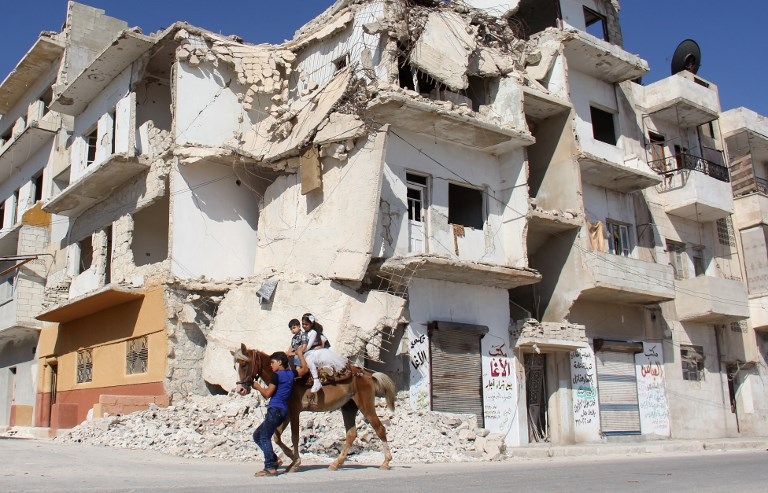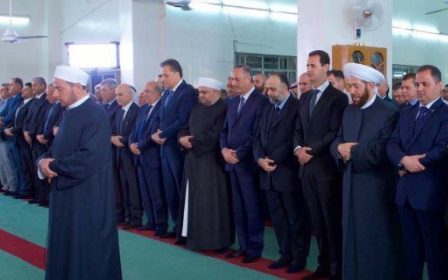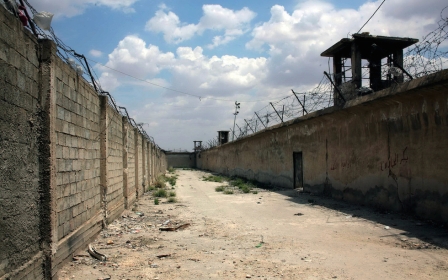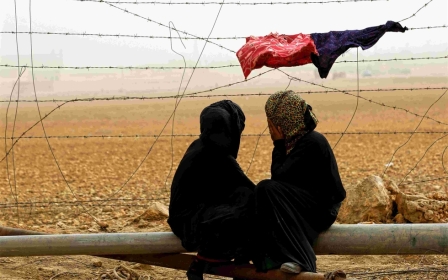UN sees IS defeats in Syria by October, elections possible in a year

Islamic State's remaining three Syrian strongholds are likely to fall by the end of October, which must be the trigger for the international community to push for free and fair elections, UN Syria envoy Staffan de Mistura said on Friday.
"What we are seeing is in my opinion the beginning of the end of this war… what we need to make sure is that this becomes also the beginning of peace. And that is where the challenge starts at this very moment," he said in an interview for the BBC Radio 4 Today show.
He added: "After [the liberation of] Raqqa and Deir Ezzor, and that is a matter of a few months, there will be a moment of truth. If the international community will be helping both the opposition and the government by pushing the government to accept a real negotiation, then within a year there would be a possibility of having a truly credible election.”
The city of Deir Ezzor has been under siege by Islamic State fighters for years, forcing the UN and Syrian government to conduct an unprecedented and expensive high-altitude airdrop campaign to supply the population.
Peace in October?
"The Syrian government and the Russians are very likely between now and the end of this month or perhaps early October, latest, to liberate it," Mistura said.
The United States and the US-backed Syrian Democratic Forces "will probably liberate Raqqa by the end of October".
A third area, Idlib, is "full of al-Nusra, which is al-Qaeda,” Mistura said, referring to Jabhat Fateh al-Sham, formerly known as the Nusra Front, a one-time al-Qaeda affiliate. It has been renamed and merged with other groups, but remains the only force in Syria's war, apart from IS, that is designated by the UN as a terrorist organisation.
The lesson drawn from the Iraqi city of Mosul, taken over by IS a decade after the United States declared "mission accomplished" in the war in Iraq, was that Syria's war needed to be followed by a fair, UN-managed election, without neglecting minorities.
The UN envoy's intervention comes as France's foreign minister said on Friday he wanted major powers to agree on a transition calendar that would be imposed on Syrians, but ruled out any role for President Bashar al-Assad, who he said had "murdered" part of his population.
Despite different approaches and disagreements within the international community, the changing military situation should trigger a push for free and fair elections, Mistura said.
Syria's war has largely pitted Sunni Muslims, backed by Gulf states and Turkey, against forces loyal to President Bashar al-Assad, an Alawite, who is backed by Shia allies, including Iran and Lebanese Hezbollah militias.
An unrepresentative peace deal would leave the door open to a resurgence of Islamic State.
“Even those who believe they won the war – that is the government – they will need to make a gesture, otherwise Daesh will come back in a month or two months’ time.”
Nobody had an interest in a resurgence of IS in Syria, Mistura said. Assad's allies in Moscow, recalling the Soviet experience of war in Afghanistan, "certainly want an exit strategy".
"We are getting close to some kind of understanding even among those who have been involved in the conflict that the priority is to close it. What we need to do is wrap it up in a way that is stabilised, not just close the conflict."
French foreign mininster Jean-Yves Le Drian's comments on Friday come despite what has appeared to be a softening in France's position since the arrival of President Emmanuel Macron.
Macron's election victory gave France, which is a key backer of the Syrian opposition and the second-largest contributor to the US-led coalition fighting Islamic State, a chance to re-examine its policy in the country.
The change proposed by Macron was to drop demands Assad step down as a pre-condition for talks, although French officials still insist he cannot be the long-term future for Syria.
But Le Drian, who was defence minister under former President Francois Hollande, said the situation had changed because Islamic State militants were on the verge of defeat.
The focus now, he said, could turn to resolving the six-year civil war that has killed more than 330,000 and led millions of people to flee the country.
Contact group
That position has also put it at odds with Russia and Iran, both backers of Assad, who say it is for the Syrian people to decide on their future.
While Britain has said Assad must go, diplomats say the United States has yet to outline a vision for a political process in Syria and is focusing primarily on defeating Islamic State.
Le Drian said if regional powers and the permanent members of the Security Council, which include France, agreed on banning chemical weapons, humanitarian access, and eradicating what he called internal terrorist groups, then they could proceed to a solution through an international contact group.
A political transition would involve a new constitution and an election, he said.
"That's what we want to do now even before Assad leaves. We do that independently because if we wait for the Syrians to agree we will wait a long time and there will be thousands more dead," Le Drian said.
Macron has repeatedly said he wants to create a new contact group, but French diplomats have so far been unable to explain how it would work and who would be part of it.
New MEE newsletter: Jerusalem Dispatch
Sign up to get the latest insights and analysis on Israel-Palestine, alongside Turkey Unpacked and other MEE newsletters
Middle East Eye delivers independent and unrivalled coverage and analysis of the Middle East, North Africa and beyond. To learn more about republishing this content and the associated fees, please fill out this form. More about MEE can be found here.





